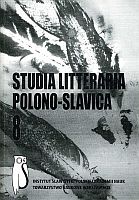Potoczność i wypowiadanie. Przyczynek do antropologii codzienności
Colloquialism and Uttering: A Contribution to Anthropology of „Everyday Life”
Author(s): Zbigniew KlochSubject(s): Cultural Essay, Political Essay, Societal Essay
Published by: Instytut Slawistyki Polskiej Akademii Nauk
Summary/Abstract: The article is an attempt to establish, on the one hand, a dependence between colloquialism, understood as the semiotic sphere of culture, and on the other – uttering and utterance (I refer here to the differentiation by Émile Benveniste) as one of the many elements of everyday life discourse that constitute our experience of the semiosphere. From the theoretical point of view, this is the development of the theses from the book Odmiany dyskursu (Varieties of the discourse), Wrocław 2006. The theoretical part talks about the role such categories as „everyday life” and „colloquialism” play in the development of the identity of a culture participant. The analytical part is dedicated to the ways of articulation of such experience by linguistic means. One of the ways to express experiencing of the reality can be found in utterances about it, which (due to mass media) often turn into metaphorical formulas. In more detail, the article analyses the speech of Benedict XVI in Auschwitz in 2006 and the utterance of Tadeusz Mazowiecki taken from his parliament speech in 1989: „The past is to be cut off with a thick line”.
Journal: Studia Litteraria Polono-Slavica
- Issue Year: 2008
- Issue No: 8
- Page Range: 191-204
- Page Count: 14
- Language: Polish

